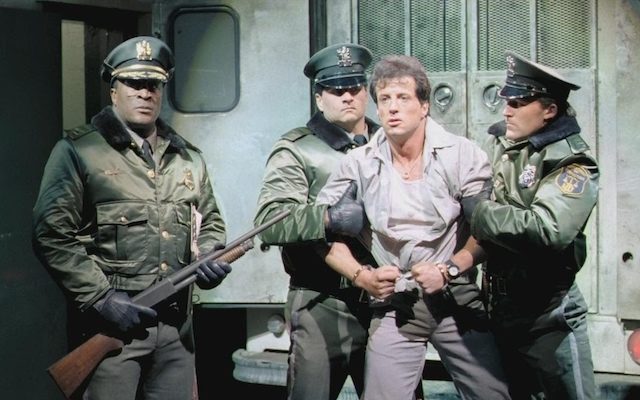
Throughout the 1980s, whenever Sylvester Stallone wasn’t busy making a “Rocky” or a “Rambo,” he would dial his agent’s phone number, hold the receiver up to his mouth, and make a series of unintelligible groans and grunts that signified, when translated into human language, that he wished to make a movie that wouldn’t take very long or have very many words for him to try to say. The result of one such request was “Lock Up.”
This is the movie where Stallone is in prison, playing a skilled auto mechanic named Frank Leone. We don’t know at first what Frank was convicted of, but we assume he was wrongfully accused or that his actions were morally justified, since Stallone’s contract stipulates he will not play an out-and-out bad guy. (Other characters off-limits to Sly: cowards, very tall men, literature professors, Asians.)
Whatever Frank’s transgression was, it couldn’t have been too serious, as he’s incarcerated at one of those relaxed movie prisons where the guards and inmates are all pals and everything operates on the honor system. The movie begins with Frank returning from a weekend furlough, cheerfully strolling back into prison after two days out like a man returning to work at a dull but not unbearable job. “Did you see the game?” asks a jovial prison guard, probably because the screenwriter neglected to replace the screenplay software’s default dialogue with real dialogue.
This pleasant arrangement is shattered when Frank is suddenly transferred to a meaner, scarier prison called Gateway. “Aaauuuyyyoooaaa!” he cries. “Whaaa gaaannnn suuuu?” The answer to his plaintive query is that the warden at this other prison, the sadistic, comically named Drumgoole (Donald Sutherland), has a grudge against Frank. Seems he was Frank’s warden back when he was first incarcerated, and when Frank escaped from that previously-never-escaped-from facility (how he did this is not mentioned), a humiliated Drumgoole was reassigned to Gateway, which is a hellhole, even for the employees. Frank got five years added to his sentence, but that wasn’t enough to soothe Drumgoole’s burning wrath. Drumgoole wants to punish him personally. So he pulled some strings, and now Frank must spend his final six months under his thumb, subjected to his every evil whim.
My goodness! This all sounds very erotic and steamy, doesn’t it? I have seen movies like this before, usually very late at night on Cinemax, in which cruel wardens with personal obsessions enact their perverse fantasies on whichever nubile young inmate has caught their fancy. But for some reason “Lock Up” turns out not to be like that at all, except in our imaginations.
Now, lest we think Frank’s prior escape from prison means he is dishonorable or guilty, the movie takes pains to reassure us that such is not the case. Frank doesn’t do things that are immoral or unethical. Awesome and badass, sure! But not “wrong.” See, what happened was that his prison sentence was nearly over anyway, and he wanted to spend an hour — just an hour! — with his dying father before it was too late, and Drumgoole wouldn’t let him go, not even with a chaperone, so he broke out. And the reason he was incarcerated to begin with is that he beat up some punks who had beaten up an old man. Frank Leone is basically Jean Valjean.
With that settled, we can return to our titillating story of bondage. Drumgoole does mean things like put Frank in solitary for no reason, hoping to break his spirit or provoke a reaction, but Frank remains a Zen-like prison guru who dispenses calm wisdom to his fellow inmates. “Guh eeg yoh,” he tells one. “Glahhh waa eoo brampf. Brampf!” A prisoner named Dallas (Tom Sizemore), who had heard of Frank’s prior escape and is a fan of his work, seeks guidance in perpetrating his own prison break. He tells Frank what his plan is, and Frank points out seven or eight obvious reasons why it won’t work. Dallas is awestruck and grateful. You see, in the land of morons, a man who is merely dimwitted can be king.
Not everybody likes Frank, though. The meanest SOB in the place, a hulking menace with the unfortunate name of Chink Weber (Sonny Landham), makes it his business to persecute Frank at every opportunity. “You’re dead, Leone!” says Chink Weber a hundred times. Then we learn that Chink Weber is doing this because Warden Drumgoole has ordered him to do so (why Chink Weber is willing to obey the warden is not mentioned). In other words, everything unfair that happens to Frank is the result of a coordinated conspiracy, and is never because of anything Frank has done.
Frank gets a job in the prison’s auto shop, which I guess is a thing? They let felons fix cars for fun? Eh, why not. Frank and several of the nicer inmates fix up a classic car in montage fashion, including some playful fights with the spray paint, and it’s set to pleasant, wistful music, and this is all very pointless and uninteresting but otherwise not like the rest of the movie.
One of the guys, nicknamed First Base (Larry Romano), is a 20-year-old kid serving two life sentences for — surprise, surprise — tragically getting mixed up with the wrong gang and being in the wrong place at the wrong time (i.e., like every other inmate except Chink Weber, First Base is actually a good guy, and it’s the warden and guards who are bad). He never learned how to drive! In a touching sequence, he sits in the driver’s seat of the newly restored vehicle while Frank pushes him in a circle around the garage, the two men using their imaginations to pretend they’re on the boardwalk in Atlantic City (which seems like a lateral move compared to being in prison, but whatever). It is very much like Mr. Rogers’ Neighborhood.
Just about everything in the film that pertains to the auto shop could have been deleted without affecting the story, which is really about Drumgoole’s increasingly desperate and elaborate schemes to make Frank Leone do something that would justify killing him. At length we arrive at the apex of Drumgoole’s fixation, a complicated plan that involves making Frank think his girlfriend is in imminent danger so that he will attempt to escape from prison to save her. It’s the old “tell an inmate you’re going to hire someone to rape his girlfriend so he’ll break out and get in trouble” routine! Oldest trick in the book.
Frank falls for it, of course, gets caught — then turns the tables and forces Drumgoole to confess everything! Some prison guards get killed in the process, but only the corrupt ones. Poor dumb Dallas gets killed, too, but only because he was a turncoat who sold Frank out. The movie’s point is that all cops aren’t necessarily “good,” nor are prisoners necessarily “bad.” No, the only true metric for determining whether a man is honorable is looking to see whether he is with Frank Leone or against him. Frank Leone is the standard of morality and justice, and all who oppose him shall be smitten, amen.
— Film.com





